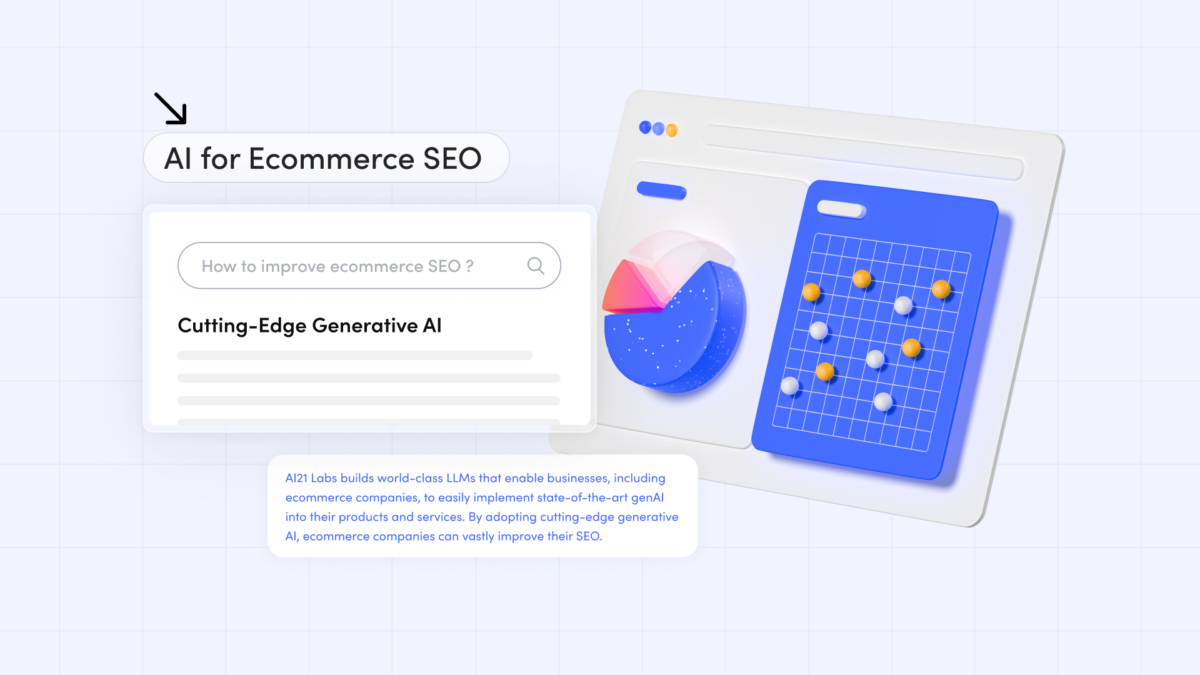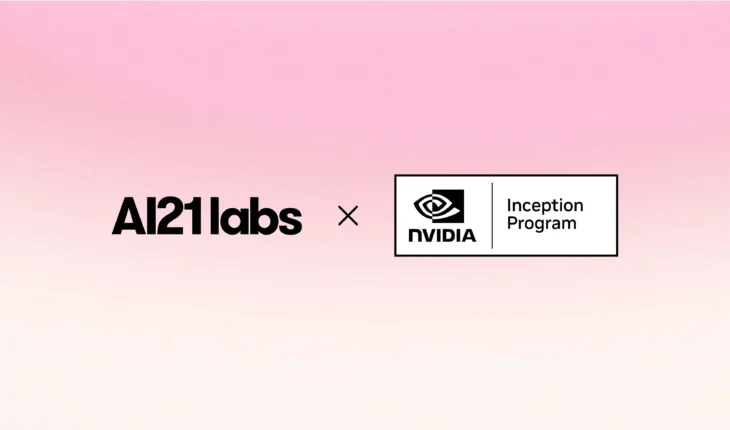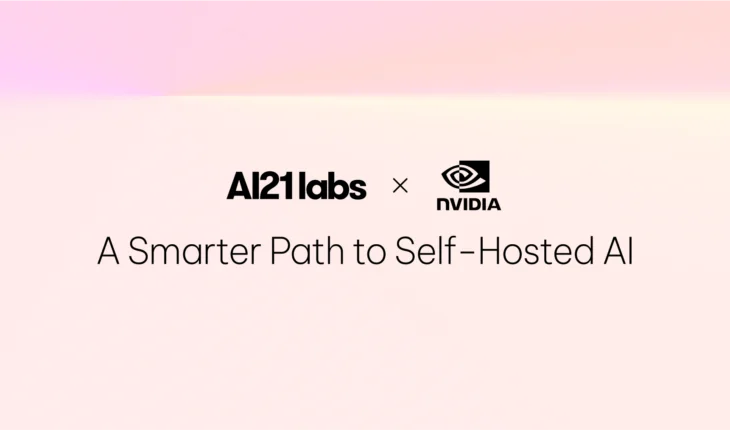Table of Contents

The Use of Generative AI in Ecommerce SEO
When it comes to optimizing websites for SEO, ecommerce businesses face even greater challenges than regular companies.
These challenges include generating relevant and high-quality content at scale, optimizing traffic based on factors like seasonality and events, and generating thousands of pages that target different keywords.
For executives and SEO managers concerned about the overall budget and effectiveness of their SEO strategy, Generative AI proves to be an effective solution.
This guide offers a deep dive into common ecommerce SEO challenges and how Generative AI can help overcome them.
Ecommerce SEO challenges
1. Producing relevant and high-quality content at scale
Creating quality content for an online store with a multitude of items can be challenging. It requires conducting research, writing, editing, and optimizing content, all of which takes a lot of time and energy, particularly considering the sheer number of items. Moreover, as the number of products increases, maintaining consistency and uniqueness becomes more difficult, leading to potential issues, such as duplication. It takes a delicate balance of manpower, expertise, and budget to balance scale, with SEO-optimized content for each product.
2. Optimizing content
Equally crucial to content creation is the adoption of an ongoing review and optimization process of existing content. This is directed by a range of factors, including user’s search patterns, seasonal shifts, and emerging trends. For instance, during Christmas, buyers are more likely to search for keywords such as “Christmas sweater” rather than “winter sweater.” Therefore, when Christmas approaches, ecommerce businesses need to tweak multiple listings to optimize them accordingly.
Regardless of how minor the changes are, implementing them across thousands of product listings is a challenging and resource-intensive task.
3. Dealing with Google’s Search Generative Experience (SGE)
With the anticipated introduction of Google’s Search Generative Experience (SGE), users will see new search results, featuring summary snapshots generated by Google’s AI bot. This means that standard search results will be pushed even further down the search page, making it crucial to optimize title tags and other content.
To improve their chances of appearing in Google’s Shopping Graph, ecommerce businesses will have to be aware of how the search engine’s algorithm works, and create high-quality, accurate, and valuable product-led content accordingly.
4 ways to use Generative AI in ecommerce SEO
With these challenges in mind, let’s explore how Generative AI can help.
1. Generate various forms of content at scale

Ecommerce businesses can use Generative AI to create different forms of content at scale. These include:
Product descriptions
With Generative AI, ecommerce businesses can automate the process of writing product descriptions at scale, helping them to rank higher in SERPs, which will become increasingly more challenging with the roll out of SGE.
The benefits of LLM based product description generators, which can be tailored to each specific company’s needs, is that they can be trained to follow a specific format, length, and tone of voice, in order to keep all of the content consistent and in line with the brand’s tone.
On-page SEO elements
Generative AI can also help generate on-page SEO elements at scale, including page titles, meta-descriptions, and alt-texts.
This way, ecommerce businesses can save countless hours and resources that they’d have otherwise had to spend doing it for each product listing individually.
FAQs
Customers will inevitably have questions about products, delivery times, policies and more.
Generative AI can help produce relevant questions and answers at scale, enabling ecommerce stores to give as much information as possible to all of their users, and increase their chance of being ranked.
Product-led content
Product-led content such as blog posts, newsletters, and how-to pages can help ecommerce businesses give in-depth answers to user queries, and then direct them back to the relevant product listings.
For example, let’s take a retail store that specializes in selling various advanced gadgets, including high-quality earphones. In this situation, the store can create a helpful “how-to” guide where it would explain how to fix earphones that aren’t working.
Here too, using Generative AI’s text generation abilities, ecommerce businesses are able to produce valuable product-led content more easily and at scale.
Generate content in multiple languages
AI can also be used to generate content in multiple languages, whether it’s blog posts, user guides, product descriptions, or other types of content.
Pro-tip: AI21 Labs’ Jurassic-2 (J2) models can be integrated into your website or application to help with content generation. According to our internal evaluations from HELM, the leading benchmark for language models, Jurassic-2 Ultra scores a win-rate of 86.8%, solidifying it as a leader in the LLM space. Furthermore, J2 models support a number of languages, including French, Spanish, Portuguese, German, Dutch, and Italian, as well as English.
Content Optimization
Generative AI can also serve as a significant component, not only in crafting first drafts of content such as product descriptions, blog posts, etc., but also in enhancing content optimization. When shifts occur in seasonality or user search patterns, businesses can harness the capabilities of text generation. By inputting appropriate changes which need to be made, an AI text generation tool can seamlessly produce updated content, while retaining the original structure.
2. Provide a great user experience
Websites that provide an excellent user experience are ranked higher by search engines.
With the help of Generative AI, ecommerce businesses can implement a Contextual Answers solution to help answer any question customers may have.
With Contextual Answers, AI21 Studio’s question answering solution, an ecommerce business can implement an automated response system on their website, which retrieves its answers from a specific library of documents, such as help center content. This response system is able to provide accurate and relevant answers based only on the content available in those libraries.
This can further help reduce customer support wait times and provide instant answers to customer queries, enhancing the overall user experience.
Contextual answers can also be used internally, by the support team. If they are engaging in conversation with a user, and do not know the answer to a specific question, they can use the Contextual Answers solution to search for the response they need from within the company’s internal databases. This too can reduce wait times, and improve the customer satisfaction, further improving the users’ experience on the website.
3. Create AI-powered tools
With the help of LLMs, ecommerce businesses can create AI-powered tools with the goal of generating traffic for them.
A great example is an AI-powered birthday greeting generator for a gift shop.
When a customer visits the online store, they can access this tool by clicking on a designated button. The tool will prompt users to input basic information like the recipient’s name, relationship to the sender, age, and any specific preferences they have for the greeting (e.g., sentimental, humorous, poetic).
Based on the user’s input, this tool will generate personalized birthday greetings for the recipient.
When the user purchases a gift from your online store, they can choose to send their personalized greeting card along with the gift. This AI-powered birthday greeting generator can add a special touch to the gift-giving experience, making it more memorable and heartfelt, improving the customer’s overall experience.
Similarly, ecommerce businesses can create relevant AI-powered tools for their online store, helping them deliver a memorable shopping experience.
4. Implement Programmatic SEO
Programmatic SEO is the method which SEO experts use to generate large amounts of organic search traffic by publishing mass-produced pages that have been generated automatically or semi-automatically.
Through Programmatic SEO, a business can create thousands of pages with content that addresses simple yet repeatable key phrases on search engines.
For example if you run a bookstore, by leveraging programmatic SEO, your team can generate thousands of pages, each featuring a unique summary for every book. These pages can target the keyword structure – “book name + summary”. In such cases, Generative AI can also be used to summarize long documents into shorter content. AI21 Labs’ summarization capabilities can create accurate summary pages for different types of content, while still staying true to the original content.
Trip Advisor is an example of successful Programmatic SEO. They have more than 7,00,00,000 pages indexed on Google, with different sets of target keywords. Their pages are so well optimized that most of these pages rank on the first page when you search for something related to hotels, places, and all-things-travel.

With enough information, Generative AI can help create substantial and valuable content for each page, addressing specific user queries and providing useful information.
Conclusion
In conclusion, Generative AI offers a game-changing solution to the intricate challenges of Ecommerce SEO.
From generating high-quality content at scale to optimizing for evolving trends and languages, AI streamlines processes that otherwise strain resources. Implementing AI-powered tools further enhances user experiences.
By integrating AI21 Labs’ models, businesses can navigate these complexities, boosting SEO quality and efficiency and ensuring a promising path forward for online success.


